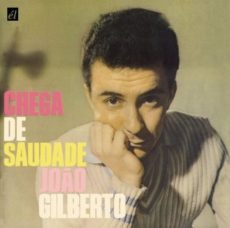
Daily Dose Of Jazz…
João Gilberto Prado Pereira de Oliveira was born on June 10, 1931 in Juazeiro, Bahia, Brazil. From an early age, music was a part of his life with his grandfather buying him his first guitar at the age of 14. During high school he teamed up with some of his classmates to form a small band and was influenced by Brazilian popular songs, American jazz, and even some opera, among other genres. After trying his luck as a radio singer in Salvador, Bahia he was recruited in 1950 as lead singer of the vocal quintet Garotos da Lua (Moon Boys) and moved to Rio de Janeiro. A year and a half later, he was dismissed from the group for his lack of discipline, showing up late to rehearsals or not at all.
João Gilberto’s first recordings were released in Brazil as two-song 78-rpm singles between 1951 and 1959. In the 1960s, Brazilian singles evolved to the “double compact” format, and João would release some EPs in this new format, which carried 4 songs on a 45-rpm record. For seven years, Gilberto’s career was at a low ebb. He rarely had any work, was dependent on his friends for living quarters, and fell into chronic depression. Eventually, in 1955 he was rescued from this rut by Luiz Telles, leader of the vocal group Quitandinha Serenaders, where he blossomed musically. His first bossa nova song was Bim-Bom, written as Gilberto watched passing laundresses on the banks of the Sao Francisco River balance loads of clothes on their heads.
This style, which Gilberto introduced in 1957, created a sensation in the musical circles of Rio’s Zona Sul, and many young guitarists sought to imitate it. It was first heard on record in 1958 in a recording of Chega de Saudade, a song by Jobim and Vinicius de Morais. With this success launching his career and the bossa nova craze, João featured new songs by a younger generation of performer/composers such as Carlos Lyra and Roberto Menescal on two more albums. By 1962, bossa nova had been embraced by North American jazz musicians such as Herbie Mann, Charlie Byrd, and Stan Getz, who invited Gilberto and Jobim to collaborate on what became one of the best-selling jazz albums of all time, Getz/Gilberto. Through this album, Gilberto’s then wife Astrud—who had never sung professionally prior to this recording session became an international star, and the Jobim/de Moraes composition The Girl from Ipanema became a worldwide pop music standard.
Gilberto went on to work with Claus Ogerman, Clare Fischer, Caetano Veloso, Gilberto Gil and Maria Bethânia among other collaborations. He won a Grammy Award for Best World Music Album in 2000 for his album João Voz E Violão. Singer, guitarist and composer João Gilberto continued to perform, record and composer until declining health and financial issues took their toll and on July 6, 2019 he transitioned at his apartment in Rio de Janeiro, Brazil. He was 88.


